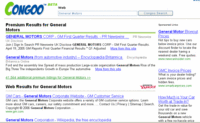Congoo launches new service for premium content
![]() New startup Congoo last week launched a search engine focused on premium subscription content. Congoo includes more than thirty premium content providers including the Wall Street Journal, Morningstar, the Street.com, Institutional Investor, ESPN, the FT, PRNewswire, Encyclopaedia Brittanica and more.
New startup Congoo last week launched a search engine focused on premium subscription content. Congoo includes more than thirty premium content providers including the Wall Street Journal, Morningstar, the Street.com, Institutional Investor, ESPN, the FT, PRNewswire, Encyclopaedia Brittanica and more.
 The results pages show premium content at the top, then free Yahoo search results at the bottom of each page.
The results pages show premium content at the top, then free Yahoo search results at the bottom of each page.
The Congoo model is a “try then buy” approach. As a Congoo user, you get free access to a given number of articles from each content provider. The specific number is set by the content provider.
 At the heart of Congoo is their NetPass. The NetPass is a toolbar plugin that makes the Congoo system secure for premium content. Unlike a simple cookie-based approach, which can be easily circumvented (just delete the cookie and create a new user name), the NetPass is a permanent cookie that can only be deleted by uninstalling the toolbar, rebooting and reinstalling. The NetPass is what allows Congoo to enforce the “try then buy” approach.
At the heart of Congoo is their NetPass. The NetPass is a toolbar plugin that makes the Congoo system secure for premium content. Unlike a simple cookie-based approach, which can be easily circumvented (just delete the cookie and create a new user name), the NetPass is a permanent cookie that can only be deleted by uninstalling the toolbar, rebooting and reinstalling. The NetPass is what allows Congoo to enforce the “try then buy” approach.
From the publisher perspective, one benefit is that Congoo shares details on your visitors. The NetPass captures and holds basic identity information (email, gender and zip code), which is then passed to publishers as users use the free content. Of course, the publishers’ hope is that their content is like heroin: once a user has a few free tastes, they’ll come back and pay for a subscription.
The Congoo business model is simply based upon running Google Adsense ads along the right side of their screen. So, Congoo aims to drive subscriptions for its publishing partners, while generating advertising revenue as a typical search engine. The Congoo founders come from the content industry, notably CEO Ash Nashed, formerly of Choice Media and Advanstar. According to Nashed, Google and other search engines are focused on the end-user, while Congoo is focused on the needs of premium publishers.
I took Congoo out for a test drive, with mixed results.
 When I did a search for “Bank Secrecy Act”, it found nearly 700 premium content listings that matched. However, the bulk of these were press releases from PR Newswire or Businesswire, with a few Institutional Investor articles mixed in. The press releases could easily be found for free using Google News.
When I did a search for “Bank Secrecy Act”, it found nearly 700 premium content listings that matched. However, the bulk of these were press releases from PR Newswire or Businesswire, with a few Institutional Investor articles mixed in. The press releases could easily be found for free using Google News.
I then tried a search for “Dodge & Cox Stock”, a mutual fund. There were about 400 results for this search. Knowing that Morningstar was a Congoo partner, and knowing Dodge & Cox Stock had just received a high “stewardship” grade from Morningstar this morning, I had hoped to see a Morningstar profile among the top results. But, while there were a few older Morningstar articles among the top 10 results, I didn’t see the profile, nor did I see this morning’s article on high stewardship.
Last, I did a search for General Motors. The first page of results were a combination of PR Newswire press releases and variations on a listing from Encyclopaedia Brittanica. While Encyclopaedia Brittanica’s content is not freely available on the web, a more thorough listing for GM could be found at wikipedia.
I think that Congoo has a high hurdle to clear. Users who have regular need for content in a specific vertical are likely to already know about the products in that market, and either subscribe or consciously decide not to. The Congoo user who finds a document via search is very different. They may need a specific document or article now, but they are probably using Congoo either because they don’t have a regular need for that type of information OR they have knowingly decided not to subscribe. In my opinion, pay-per-view is a more appropriate model for the occasional user who has an urgent need for information at that moment.
In addition, Congoo’s content partners today are somewhat limited. My test searches found that the majority of the information consisted of press releases and other content that is available for free on the web.
There clearly is a market opportunity for providing premium content to SOHO users, professionals away from the office and other users. Other providers, such as Highbeam, have developed a much more comprehensive library of content, while transactional services like our own Alacra Store cater to the “need it now” customer. It will be interesting to see if Congoo can find a niche for itself in the premium content business.







Press releases are free until their 90th day of release, then you have to pay a fee to view them. Same thing with newspaper articles, after 30 days, you have to pay. Also I think these guys are partnered with Yahoo not google. They claim over 200 sources not 30. Also I dont see ESPN or WSJ. Did I visit the same site you did?
Posted by: David Jenson | March 28, 2006 at 01:30 PM
This is interesting, I see all the results I get on yahoo. Why would anyone search Yahoo when you could get those same results on this site plus premium content too? Why would Yahoo give their search results away like this? Maybe they are paying them??
Posted by: Jennifer Burton | March 28, 2006 at 01:47 PM
With regard to Yahoo giving their web results away, they do that to 100 sites. Google, MSN and ask also give their web results away to tons of different sites. Web results are a commodity now, anyone can show those.
Posted by: Gabe | March 28, 2006 at 02:10 PM
I tried a search on congoo:
http://www.congoo.com/web?query=heart+surgery
Posted by: Gabrielle | March 28, 2006 at 03:21 PM
This congoo is a rockin-a-man!
I lika a sipin de tequilla en gettin en da free content...horaleeee hombree!
Posted by: enrique gonzales | March 31, 2006 at 12:23 AM